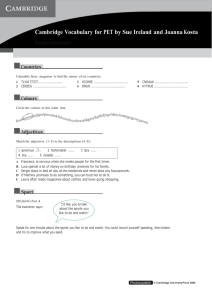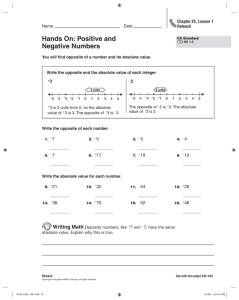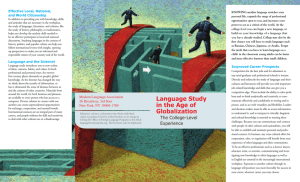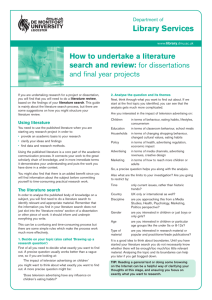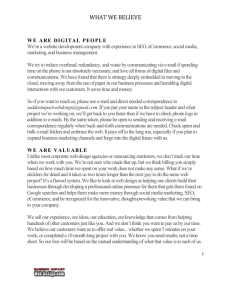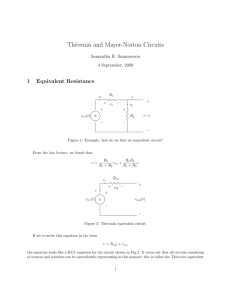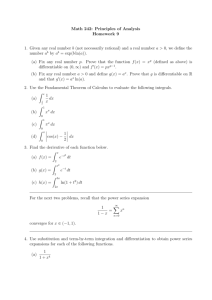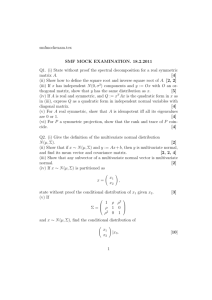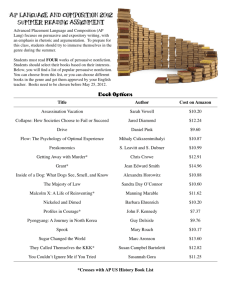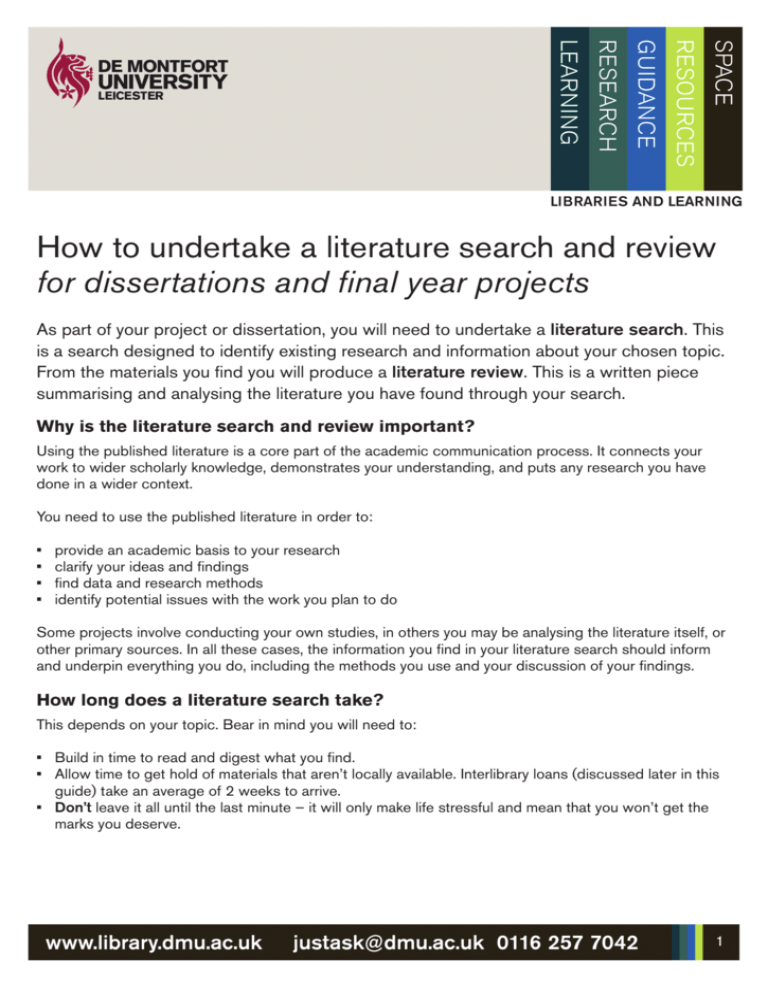
How to undertake a literature search and review
for dissertations and final year projects
As part of your project or dissertation, you will need to undertake a literature search. This
is a search designed to identify existing research and information about your chosen topic.
From the materials you find you will produce a literature review. This is a written piece
summarising and analysing the literature you have found through your search.
Why is the literature search and review important?
Using the published literature is a core part of the academic communication process. It connects your
work to wider scholarly knowledge, demonstrates your understanding, and puts any research you have
done in a wider context.
You need to use the published literature in order to:
•
•
•
•
provide an academic basis to your research
clarify your ideas and findings
find data and research methods
identify potential issues with the work you plan to do
Some projects involve conducting your own studies, in others you may be analysing the literature itself, or
other primary sources. In all these cases, the information you find in your literature search should inform
and underpin everything you do, including the methods you use and your discussion of your findings.
How long does a literature search take?
This depends on your topic. Bear in mind you will need to:
• Build in time to read and digest what you find.
• Allow time to get hold of materials that aren’t locally available. Interlibrary loans (discussed later in this
guide) take an average of 2 weeks to arrive.
• Don’t leave it all until the last minute – it will only make life stressful and mean that you won’t get the
marks you deserve.
1
A literature search can be a daunting process, but there are some simple steps which can help you plan
and manage the process:
1.
2.
3.
4.
5.
Picking your research question
Planning your search
Evaluating and recording your results
Reviewing your search plan
Synthesising your results
The diagram below shows how these steps interact as you move through the literature search and review.
This guide will look at each step in more detail.
As you go through this process you may find you need additional help. You can get help from your
colleagues, your tutor, by going to an information desk or by arranging to see your subject librarian.
Suggestions of where to find help on particular issues are made throughout the guide.
1. Picking your research question
First you will need to decide what you want to find out. You will probably start with a fairly broad idea of
the area you want to look at, e.g.
‘The impact of television advertising’
Asking yourself some questions will help you focus down on the exact topic you want to study.
2
TIP: Reading a general text or doing some browsing on the Internet can be a helpful way of clarifying
your thoughts at this stage, and picking exactly what you want to research.
Being as specific as possible in the question you ask will make your literature search and your project
more manageable. For example, when looking at television advertising you would need to specify whether
you were interested in:
Children
Education
Households
Policy
Advertising
Marketing
in terms of behaviour, eating habits, lifestyles, consumerism
in terms of classroom behaviour, school meals
in terms of changing shopping behaviour, changed cultural values, eating habits
in terms of health, advertising regulation, economic impact
in terms of media channels, advertising revenues, creative design
in terms of how to reach more children or adults
You would also need to think about the limits to your investigation. You might want to restrict by some of
the following:
Time
Country
Discipline
Gender
Age
Type of material
current issues, rather than historic trends
UK only, or international as well
a Media Studies, Health, Psychological, Marketing, or Political perspective
studying children, just boys, or only girls
studying particular age groups like the under 5s or 8-12s
using only research material or including popular and practitioner/trade publications
Focusing at an early stage is a good idea, as it helps you get an idea of how much information is out
there. You can always re-focus your question later if you find too little or too much information about
your topic.
2. Planning your search
You can take a number of approaches to your search:
•
•
•
•
Systematic – you try to find all relevant material
Retrospective – you find the most recent material and work backwards
Citation – you follow up references from useful articles, books and reading lists
Targeted – you restrict your topic and focus on a narrow area of the literature
In practice, most people use a mixture of approaches. You might:
•
•
•
•
be systematic in looking at everything relevant in the library
adopt a retrospective approach when looking at journal articles
use citation searching to get useful leads if your topic crosses several disciplines
be more targeted when you have a clear picture of what you need to find out.
Choosing your Sources
There are many different sources of information. You will almost certainly need to use both books and
journal articles, but you may need to use other information sources related to your subject, such as
government reports, or sources of statistical information.
3
TIP: Your Subject Guide, available from the Library web pages, highlights the most useful starting
points in your subject area. You can also consult related Subject Guides if your topic covers multiple
subject areas.
Finding books
Books are often a good starting point. Textbooks summarise key theories and more specialised texts often
present research findings in a clear and comprehensive way. There are three key places to look:
• The library catalogue lists what is available in DMU libraries. See the ‘How to use the Library
Catalogue’ guide.
• Other library catalogues list what is available in libraries elsewhere. COPAC (www.copac.ac.uk), a
combined catalogue of the biggest libraries in the United Kingdom and Ireland, is comprehensive and
highly recommended.
• Internet booksellers (e.g. www.amazon.co.uk), may have the details of newly published books which
De Montfort University has not yet acquired.
Finding journal articles
In many subjects journals are the key resources for a literature search. They are the principal place where
research and practice are discussed and new work presented. This means a specialist or new topic will
often be better covered by journal articles than by books.
You will need to use databases to find journal articles on your topic. Some databases will give you
references so you can trace an article, others allow you to access the full text straight away. Your Subject
Guide will list the most useful databases for searching the journal and report literature, and the ‘How to
use Journals’ guide gives further guidance.
Keywords
When using either library catalogues or databases you need to pick your search terms carefully. Search
engines and library databases are not intelligent, and will match up words without considering their
meaning. This means a search for ‘apple’ will find information about both the fruit and company,
regardless of your intention.
Selecting keywords – words or phrases that describe your topic as simply and distinctively as possible –
can make searching much easier. Selecting keywords can be a straightforward process, if the words
describing your topic have a single meaning, but more often you need to think carefully about the
keywords you use to express your ideas.
Here are some approaches to try when selecting keywords:
Specific terms
Start your search by using words that are specific to your research topic and,
ideally, not common elsewhere.
Similar and
related terms
Are there other words with similar meanings? Using these alternative terms will find
a different set of results.
Spellings and
terminology
Can your search term be spelt in different ways? UK and US spellings often differ,
e.g. behaviour vs. behavior. Some databases and search engines don’t
automatically call up the US spelling or terminology.
4
Singulars and
plurals
Some databases don’t automatically look for single and plural versions of a word.
Try both. Usually people and things are plural, ideas are expressed as singular.
Combining terms
You can usually search for phrases using quotation marks e.g. “television
advertising”, and can combine terms using AND, OR and NOT, e.g. television AND
advertising (will find documents containing both words), television OR advertising
(will find documents containing either word), television NOT advertising (will find
documents which do not mention advertising).
Truncating terms
Most databases will allow you to search for terms that begin with the same set of
letters, using a symbol such as * $ or ? For example, politi* can search for politic,
politics and political. The symbol used will vary between databases so check the
help screens to find out which one to use.
Locating the materials you need
There are three major routes you can use to get access to the materials you identify find through your
searches:
i. Using De Montfort University’s resources including books and journals. You will need to use your
Single Sign-On to access most e-books, e-journals and databases.
ii. Using the inter-library loans service to obtain material not held at DMU. This allows you to request
books, journal articles, and other literature from other libraries. Contact the Library or check its
webpages for further details.
iii. Using the SCONUL Access scheme to access other university libraries. Sometimes another university
might have a special collection in the area you are researching. More information about access
schemes can be found at www.library.dmu.ac.uk/Services/Otherlibraries/ and details of participating
libraries are available at www.sconul.ac.uk/sconul-access.
3. Evaluating and recording your results
Once you have an initial set of search results, have a look at the material you have found. This will give you
an overview of what you’ve found so far, helping you identify what kind of information is out there, and
whether you’re finding the right kind of material.
As you find materials, it is also important to record the outcomes of your search plan. This will save you
time and effort when you need to re-run a search or locate references at the end of your project. You will
definitely want to record the full reference of everything you find.
It is essential that you reference all items as it:
•
•
•
•
•
ensures good academic practice by acknowledging other people’s ideas
enables your tutor to see what sources you have used
gives more authority to your arguments
shows the scope and breadth of your research
avoids plagiarism
Referencing is important regardless of whether you are directly quoting or paraphrasing the original
source. All sources you use, regardless of format, need to be referenced so ensure you reference images
and diagrams as well as printed or online material.
5
Plagiarism (presenting someone else’s material as your own) is a serious academic offence and can
result in a reduction of the mark awarded or a module failure. In extreme cases you may be expelled from
the University. However, plagiarism is easily avoided by keeping track of where you get your ideas and
referencing appropriately.
Most Faculties recommend the Harvard System for referencing but do check your module or programme
handbook. For more advice and examples on how to correctly cite your sources, refer to the Harvard
system of referencing guide available at www.library.dmu.ac.uk/Images/Selfstudy/Harvard.pdf.
4. Reviewing your search plan
Once you have evaluated and recorded your initial results, you will need to review and revise your
search plan in order to fill in gaps in the material you have found, and address any other issues you
have noted.
Literature searching is a cycle and for a typical project you will need to go through the process of
evaluating and revising several times before you have found the right material. Here are some commonly
encountered problems and potential ways in which you might revise your search plan to cope with them.
Finding too much
Sometimes you will find that there is just too much information. This might be because:
• Lots has been written on your main topic
• Your topic has links with many other subject areas
Returning to your research question and re-focusing can solve this problem by giving you a clearer idea of
what you really want to find out (see the section on Picking your research question for further details).
If your research question is already specific, you may need to revise your search plan. Things to try include:
•
•
•
•
Using more precise terms (advertising rather than marketing)
Adding in limits (television and advertising and UK)
Concentrating on key authors and books
Using database features like the help menu, or subject headings (see Tip).
TIP: Using subject headings within library databases is a great way to narrow down your search.
These are labels which summarise the main themes of an article or paper in a few words. Every article
listed in the database covering the same topic will have the same subject heading, even if different
words are used to describe the topic within the article.
Subject headings may be suggested by the database when you search, or listed in the information
about the article alongside the article title, author and abstract.
Finding too little
Sometimes you will struggle to find much relevant material. You will need to think of ways of broadening
the scope of your project. In particular you can think about:
• Making the project (or just your keywords) more general.
• Searching for comparative or related information, e.g. looking at all children, rather than a particular
age group.
6
Your tutor is a good source of advice: they can often tell you if a topic is very new, or little-studied, and
they may be able to suggest related areas of research to investigate.
Finding materials which are not ‘academic’ enough
You may worry that the materials you’ve found are not appropriate to your level of study, or your tutor may
have told you that you need to make your work more academic. This just means you need to be more
selective in your use of sources.
Two helpful ways of accessing scholarly material are:
• Limiting your search to the academic (or scholarly or peer-reviewed) journal search options available on
many of the databases, and making sure you are using academic rather than trade journals.
• Limiting your Internet search to sites which end in .ac or .edu.
TIP: Make an appointment to attend a drop-in to see your subject librarian who is an expert at finding
information in your topic area and will help you with selecting the right sources and the best search
strategies.
Continue reviewing and revising your search plan and recording and evaluating your results until you are
happy with the materials you have found. It is a good idea to start this process early in your project, and
then re-run your search as the project progresses to update yourself on newly published material.
5. Synthesising your results
You will also need to present an analysis of the literature you have found: synthesising the results of your
literature search into a literature review.
In many projects and dissertations a literature review forms a chapter of the finished piece of work, and
may be assessed as a separate assignment, handed in at an earlier stage.
The literature review is a way of demonstrating two things:
• Literature search – the materials that you have found
• Understanding and analysis – how you have put what you found into the context of your project.
TIP: Remember that the literature search underpins the whole of the work. You should also include
references to the literature when discussing your methods and findings.
The key elements of a literature review are providing an overview and argument, reading critically, writing
analytically, and identifying areas for further research. These are discussed further below.
i. Providing an overview and an argument
Start by discussing your research question and your initial thoughts. It is a good idea to provide an overall
summary of the literature you have found, in particular highlighting any gaps in research and conflicts in
theory.
Make sure that you also state your own research perspective and the scope of your investigation, in
particular what limits you established, and why you have chosen to approach the topic in a particular way.
7
ii. Reading critically
The literature you find will not be unbiased. Think and read critically. For each item you read, you might
want to consider:
• Has the author clearly defined the topic and question? Is it an effective analysis and account of the
subject?
• Is there any bias evident (political, ideological, disciplinary?)
• How scholarly is the piece of work? Trade and professional journal articles and websites are often
current but not scholarly.
• Is the argument coherent, or does the piece contradict itself?
• Are there references to sources the author consulted? Have any sources or theories been ignored or
omitted?
• Is the item as relevant to the topic which you are investigating as it initially appeared?
iii. Writing analytically
Try to summarise the arguments of different authors in relation to your own research question or topic.
Can you compare or contrast different authors or theories, or identify any emerging themes? You will need
to present an argument, or a series of points: do not just describe what different authors have written.
TIP: For more guidance on writing there are a number of guides available from the Centre for Learning
and Study Support, which also offers group or individual study tutorials on writing. For more information
see www.library.dmu.ac.uk/CLASS or email class@dmu.ac.uk.
Often you will find that your topic overlaps different subject disciplines, bringing in multiple perspectives
and different sets of literature. Pointing this out and discussing it emphasises the thoroughness of your
work.
iv. Identifying areas for further research
Finally, relate the literature review to the bigger questions within the literature or subject. You should try
and identify areas where not a lot of literature existed, as opportunities for gaps to be filled.
v. Afterwards
Once you have completed your literature review, it is a good idea to use it as an opportunity to reflect on
your own progress, both in terms of finding information and in critical reading. These are very valuable
graduate skills, and often you do not see how well you have worked until after the task is completed.
Remember that an understanding of the literature is a core part of the academic process; see it not as a
chore but as a key skill for study, research and life.
© DMU Libraries & Learning Services. All rights reserved. Publication No. 23041
Issued: 08/13
PC1989
8

